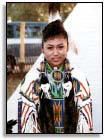
World Health Organization
Collaboration Center on Indigenous Peoples' Health

Over the past several years, there has been a growing concern throughout the world with respect to the poor health and social conditions experienced by the majority of indigenous peoples.There is recognition of the value and need to conserve indigenous cultural heritage and knowledge.
The collaboration center will require that sustainable solutions be found to preserve indigenous culture, while addressing economic, geographical, and cultural barriers to adequately care for indigenous peoples.
Currently, there is no collaboration center focusing on indigenous peoples health at an international level.
Having a collaboration center in the headquarters of Indian Health Service, to be guided by consultation with American Indians and Alaska Natives, would signify a United States commitment to work with indigenous peoples to improve their health status.
What is Known What can be shared
- There are 43 million indigenous peoples living in the Americas with a majority being children or young adults under the age of 15
- American Indians have much to teach indigenous peoples elsewhere on policy development, health priorities, goals, and allocation of resources
- An estimated 40% of the 100 million persons without regular access to care are indigenous.
- Accessibility problems range from structural, economic, and geographical; to more cultural issues of ignorance of traditional healing practices and languages.
- Indigenous peoples are suffering from preventable deaths, such as from communicable, vector-borne, and parasitic diseases.
- CCIPH could offer best known interventions in indigenous communities to increase community-based health prevention and promotion programs.
- Encroaching urbanization and economic development destructs natural environments with polluted land and waterways.
- Indigenous peoples need access to safe drinking water and sanitation. CCIPH could assist in the reduction of deaths due to diarrhea-related disease.

developed by Rollin Hu, Ravi Patel, and Desert Horse Grant